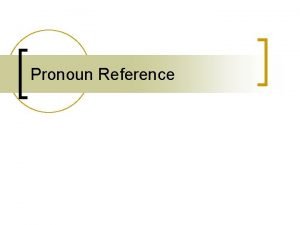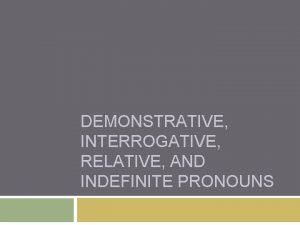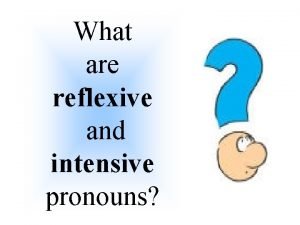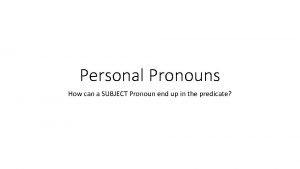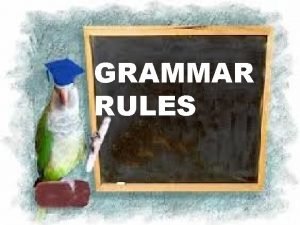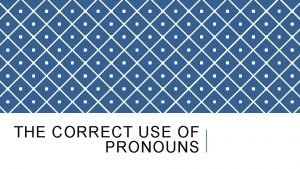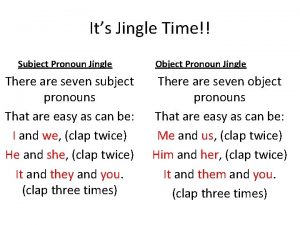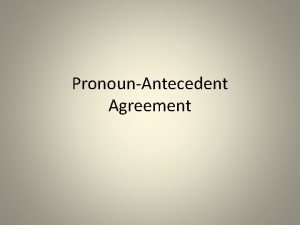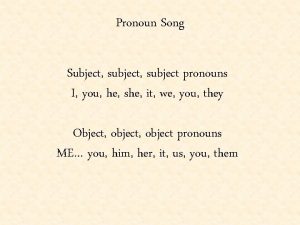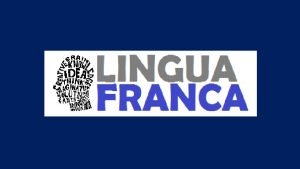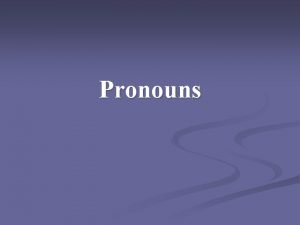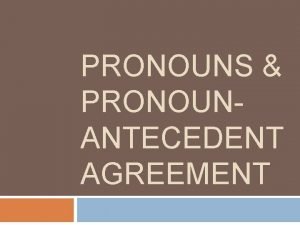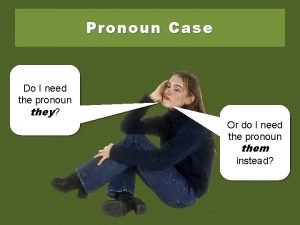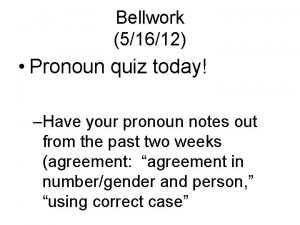l What is a pronoun A pronoun is












- Slides: 12

l. What is a pronoun? A pronoun is a word that is used_________ (p. 56)

• 2. The word that a pronoun refers to is • called its _______. (p. 58) • Example: Ramon visited Death Valley, • and he was impressed.

Personal Pronouns • • 3. Pronouns such as __, ___, ___and ___are called personal pronouns (p. 58) Each personal pronoun has three cases. Subject, object, and possessive. Subject: He read about Death Valley. Object: Julie asked him a question. Possessive: Ramon brought his book.

Predicate Pronouns • 4. A predicate pronoun follows a ____ • verb and identifies the verb’s subject. • (p. 61) • Example: The owner was he. •

Object Pronouns • • 5. An Object pronoun is used as a ___ object, an ____object, or an ____ of a preposition. (p. 63) Example: The mysterious death of King Tut fascinates me. (DO) Chu lent me a video on the topic. (IO) Will you save the video for them? (OP)

Possessive Pronouns • 6. A possessive pronoun is a ____pronoun used to show ____ or _____. (p. 65) • Example: • The Chinese museum kept its secret for years. • Is this book yours?

Contractions • • 7. Some possessive pronouns sound like _____. Example: its/it’s your/you’re their/they’re REMEMBER: A possessive pronoun never has an ____. (p. 65)

Reflexive and Intensive Pronouns • 8. A pronoun that ends in ____or • _____ is either a reflexive or intensive pronoun. (p. 68) • Copy chart of Reflexive and Intensive pronouns • 9. A Reflexive pronoun refers to the ___ • And directs the action back to the subject. • Example: Houdini called himself a master escape artist.

Intensive Pronouns • 9. An intensive pronoun _____a noun or another pronoun in the same sentence. • Intensive pronouns are not ____to the meaning of a sentence. • Example: You yourself have seen magic shows on TV.

Interrogative Pronouns • 10. An Interrogative pronoun is used to _______ a sentence. (p. 70) • Example: Who made up this riddle? • Copy chart of interrogative pronouns on page 70. • Rule: Use ___as a subject or predicate noun. • Use ____as an object.

Demonstrative Pronouns • 11. A demonstrative pronoun _____ out a person, place, thing, or idea. (p. 71) ____, and ____are demonstrative pronouns. Riddle: This has 18 legs and catches flies. These may fall far, but they never break.

Indefinite Pronoun • 12. An indefinite pronoun does not refer to • a _____person, place, thing, or idea. • (p. 76) • Example: Something unusual is going on in Loch Ness. • Has anyone photographed the Loch Ness Monster?
 Subject pronoun object pronoun possessive adjective
Subject pronoun object pronoun possessive adjective Relative demonstrative interrogative pronouns
Relative demonstrative interrogative pronouns What is subject and object pronoun
What is subject and object pronoun Intensive pronoun
Intensive pronoun Possessive interrogative pronoun
Possessive interrogative pronoun Predicate pronoun example
Predicate pronoun example What is a relative pronoun example
What is a relative pronoun example Direct and indirect speech
Direct and indirect speech Pronoun rules
Pronoun rules You plural
You plural Subject pronoun jingle
Subject pronoun jingle Hisself vs himself
Hisself vs himself Subject pronoun song
Subject pronoun song
